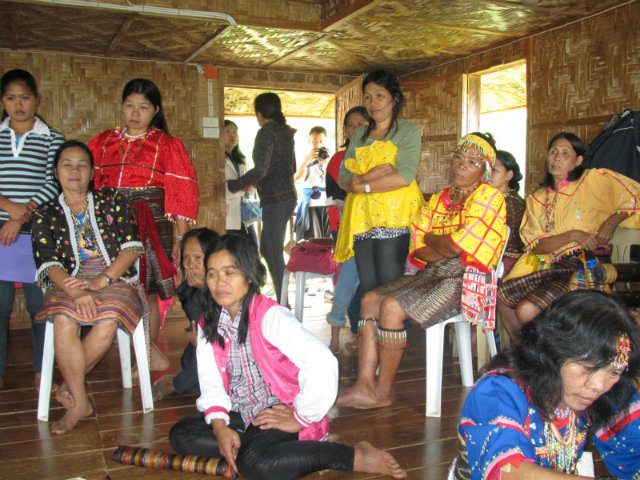SUMMARY
This is AI generated summarization, which may have errors. For context, always refer to the full article.

MANILA, Philippines – Fifty-year-old Vivencia Mamites, mother of 3, says her life was drastically changed by micro-entrepreneurship. She learned the ropes of promoting, selling, and increasing the value of her products.
Mamites comes from the Bagobo Tagabawa tribe in Bansalan, Davao del Sur. She had been trained to weave inabal, a traditional cloth of her tribe. But it was through entrepreneurship that this skill yielded maximum benefits, with inabal costumes, bags, and purses attracting their share of the market.
The tribeswoman is among the estimated 14,000 women recipients of assistance in the first phase of a project dubbed GREAT Women by the Philippine Commission on Women (PCW) and partner agencies, with support from Canada’s foreign affairs, trade and development department.
Her success story was the highlight of the launching of GREAT Women’s phase 2 on Thursday, June 25.
In a speech, Mamites said her life today is in sharp contrast with her life before becoming a business owner.
Shifting from her local dialect to Filipino from time to time, the eldest among 5 siblings said she cries when she remembers the “kahirapan na pinagdaanan ko (poverty I went through)” before entrepreneurial opportunities came her way.

Women micro-entrepreneurs (WMEs) like Mamites navigate through the barriers of female economic empowerment. PCW identified these barriers to include “discrimination into lower-paying jobs,” “inadequate access to and control over production resources and markets,” and “lack of market-driven skills and knowledge.”
According to PCW, 69% of new businesses are owned by women. On the other hand, 66% of mature and stable businesses are owned by men. Economic mobility is often difficult for women given their dual roles of having to earn and managing the household.
GREAT Women-2 seeks to empower more WMEs and link them with existing small and medium enterprises (SMEs). The P320-million project is expected to benefit some 12,000 entrepreneurs and micro-enterprise workers in food and non-food industry clusters by 2020 to 2021.
MSMEs: Key sub-sector
Micro, small, and medium enterprises (MSMEs) comprise 99.6% of Philippine businesses. They account for 61% to 70% of Philippine jobs, said the PCW in a statement, citing 2012 data from the Department of Trade and Industry.
The Philippines’ establishment and employment profile in 2012, sourced from the Department of Labor and Employment, show there are 844,760 micro-businesses or businesses with less than P3 million capitalization in the country.
| SIZE OF BUSINESS | NO. OF ESTABLISHMENTS | PERCENTAGE SHARE |
| Micro | 844,760 | 89.39% |
| Small | 92,025 | 9.74% |
| Medium | 4,136 | 0.44% |
| Large | 9,083 | 0.96% |
| TOTAL | 950,004 | 100% |
MSMEs are among key sub-sectors to benefit greatly from the full economic integration of the Association for Southeast Asian Nations (ASEAN). As the bloc moves toward a single market and production base, it also becomes important to ensure the competitiveness of local MSMEs.
Building the capacity of MSMEs is in line with one of the primary goals of ASEAN integration, which is equitable growth.
Empowering women
In the course of her training as a business owner, Mamites says she learned to maximize the utility of her products in different ways, including having inabal costumes rented out during festivals. This way, she has recurring income from items that are usually harder to sell due to their steeper prices.
With the multi-million help for the GREAT Women project from his government, Canadian Ambassador Neil Reeder said Mamites “reminds us why we’re doing what we’re doing.”
Also a partner in the project, Jeannie Javelosa of the ECHosi Foundation stressed the importance of “bridging commerce and development” in creating the envisioned inclusive society. Her non-profit “teaches sustainability issues for empowering marginalized groups, women’s groups and cultural communities.”
PCW board member May-i Fabros said the GREAT Women project creates an enabling environment for WMEs by increasing the profitability of their businesses. This allows women to “go up the value chain,” she said. – Rappler.com
Add a comment
How does this make you feel?
There are no comments yet. Add your comment to start the conversation.